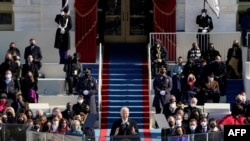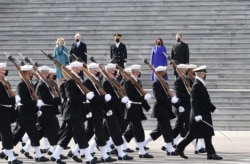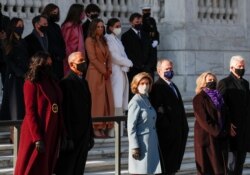Facing as monumental a set of challenges as any chief executive in generations, Joe Biden took office as the 46th president of the United States on Wednesday and pledged to rally the nation to answer "the call of history."
Standing on the steps of the West Front of the U.S. Capitol, where two weeks prior an angry mob attacked Congress in an effort to prevent the certification of his election, Biden said the nation is in "a time of testing."
"We face an attack on our democracy and on truth," he said. "A raging virus, growing inequity, the sting of systemic racism, a climate in crisis. America's role in the world."
Any one of these catastrophes would be enough to challenge the U.S. in profound ways, he said, and yet the new president was inheriting them all at once – "presenting this nation with one of the gravest responsibilities we've had."
However, in his first address to the nation as president, Biden did not dwell on the myriad problems besetting the country. Instead, he focused on what he believes is preventing the nation from dealing with them: a deep and bitter political divide that has made effective action by the federal government impossible.
A call for unity
"To overcome these challenges, to restore the soul and secure the future of America, requires so much more than words," Biden said. "It requires the most elusive of all things in a democracy: unity."
Biden's call for national unity contrasted sharply with his predecessor, Donald Trump, who had spent the preceding 11 weeks attempting to delegitimize Biden's election by spreading demonstrably false claims of election fraud. In doing so, Trump made common cause with white supremacist organizations, conspiracy theorists and right-wing extremists, ultimately inciting the attack on the Capitol on January 6 and prompting the House of Representatives to impeach him for a second time.
"I know speaking of unity can sound to some like a foolish fantasy these days," Biden said. "I know that the forces that divide us are deep, and they are real. But I also know they are not new. Our history has been a constant struggle between the American ideal that we all are created equal, and the harsh ugly reality that racism, nativism, fear, demonization have long torn us apart."
Seeming to acknowledge that a complete coming together of the American people is virtually impossible, he nevertheless pointed out that in earlier struggles in the nation's history, "enough of us – enough of us – have come together to carry all of us forward, and we can do that now."
Outreach to Republicans
Over the past week, Biden has laid out a detailed proposal to address the pandemic and its associated economic fallout, including a $1.9 trillion rescue package. While he did not get into the specifics in his address, the repeated calls for unity seemed directed, in part, at Republican lawmakers who could make it difficult for Biden to see his plan enacted into law.
While Democrats will have control of the White House and both chambers of Congress, their majorities in the legislature are microscopic, particularly in the Senate where it will take the vote of Vice President Kamala Harris to break a 50-50 tie between the Democrats and Republicans. And Kentucky Senator Mitch McConnell, now the minority leader, has shown a genius for blocking the priorities of Democratic presidents.
"Certainly November's elections did not hand any side a mandate for sweeping ideological change," McConnell said on the Senate floor on the day before Biden's and Harris's inaugurations. "Americans elected a closely divided Senate, a closely divided House and a presidential candidate who said he'd represent everyone."
As most new presidents do, Biden indeed pledged to work for the benefit of all Americans, not just those who supported him in the election. But he added to that a personal request from those who opposed him.
"Hear me out as we move forward," he said. "Take a measure of me and my heart. If you still disagree, so be it. That's democracy. That's America. The right to dissent peaceably within the guardrails of our republic is perhaps this nation's greatest strength. Yet hear me clearly: disagreement must not lead to disunion."
A message to allies
Biden, who spent much of his 36-year career in the U.S. Senate as a member and eventual chairman of the Foreign Relations Committee, asserted that in recent years the Trump administration's "America First" policies had distanced the country from its allies and diminished its role on the world stage.
"Here's my message to those beyond our borders," he said. "America has been tested, and we've come out stronger for it. We will repair our alliances and engage with the world again, not to meet yesterday's challenges but today's and tomorrow's challenges."
The United States, he promised, will again "be a strong and trusted partner for peace, progress, and security."
Aaron Kall, the University of Michigan debate coach, said Biden's inaugural address lacked "a signature line that is required to become truly memorable and stand the test of time."
But Kall added, "It won't be due to a lack of sincere trying and outreach. Biden asked the country to give his administration a fair chance, and the future success of his congressional agenda will determine how history remembers the speech during this tumultuous and unique moment in time."
A break from Trump
During the speech, Biden recognized the three former presidents who were on the stage, Democrats Barack Obama and Bill Clinton and Republican George W. Bush, as well as one, Democrat Jimmy Carter, who was unable to travel to Washington. He did not mention his immediate predecessor, Trump, who chose not to attend and has yet to acknowledge the legitimacy of Biden's victory.
However, Biden's remarks made it clear that he wants to offer the country a break from the Trump presidency, which was marked by the shattering of norms, legislative gridlock and the weaponization of the president's personal Twitter account against anyone who angered him, regardless of party.
"Politics doesn't have to be a raging fire, destroying everything in its path," Biden said. "Every disagreement doesn't have to be a cause for total war."
Returning to his theme, he said, "We can treat each other with dignity and respect. We can join forces, stop the shouting, and lower the temperature. For without unity, there is no peace, only bitterness and fury. No progress; only exhausting outrage. No nation; only a state of chaos."
Biden went on to say, "This is our historic moment of crisis and challenge, and unity is the path forward. And we must meet this moment as the United States of America. If we do that, I guarantee you, we will not fail."
'Lies told for power and for profit'
Biden saved some of his strongest implied criticism for politicians and media outlets who have contributed to an American public sphere in which members of different political factions operate with their own sets of facts.
Trump's falsehoods about the presidential election results – which he described as a landslide victory for himself – were amplified by a large network of right-wing news organizations and many prominent members of the Republican Party, all in an effort to secure the outgoing president a second term in office.
Biden suggested that participating in the spread of false information about the election placed elected officials in violation of their oaths of office.
"The recent weeks and months have taught us a painful lesson," he said. "There is truth and there are lies. Lies told for power and for profit. And each of us has a duty and a responsibility as citizens, as Americans, and especially as leaders, leaders who have pledged to honor our Constitution and protect our nation, to defend the truth and defeat the lies."
VOA's Ken Bredemeier contributed to this report.








